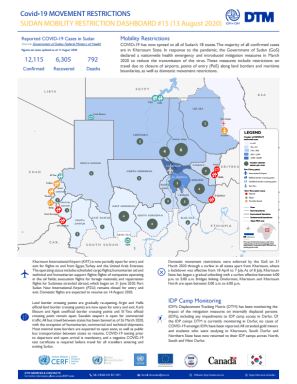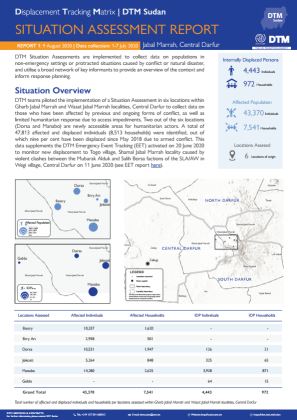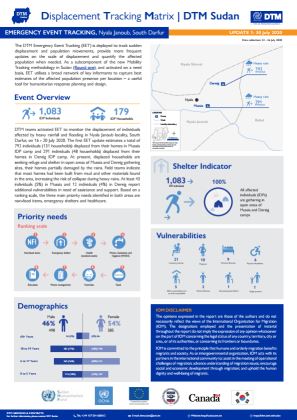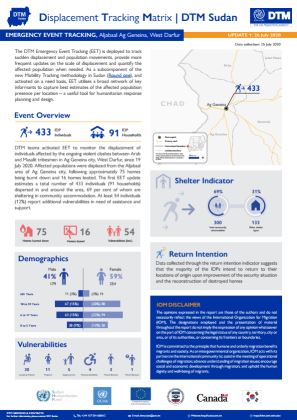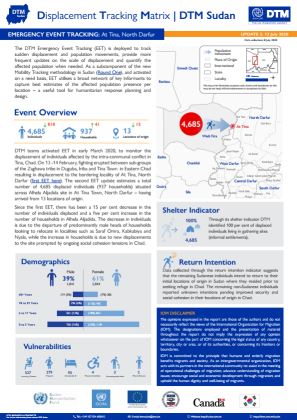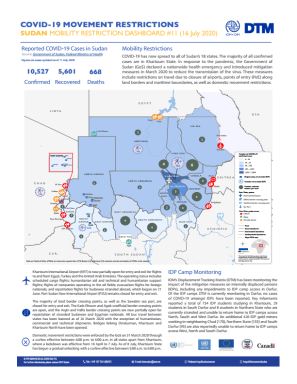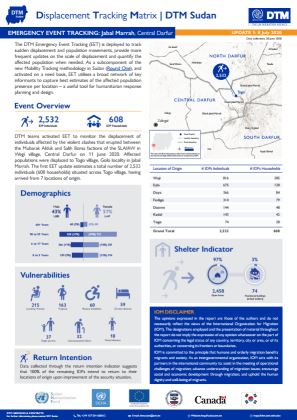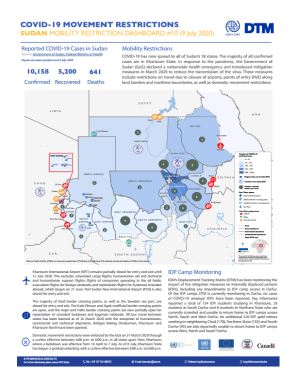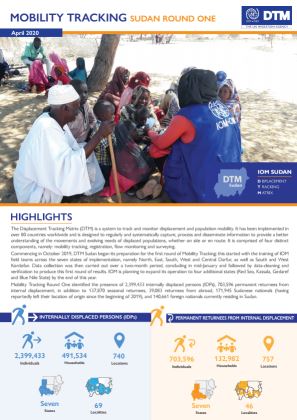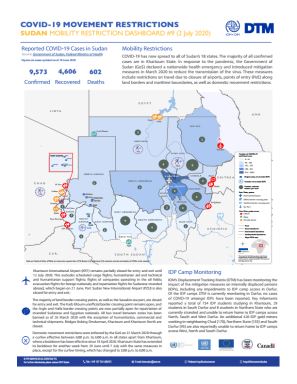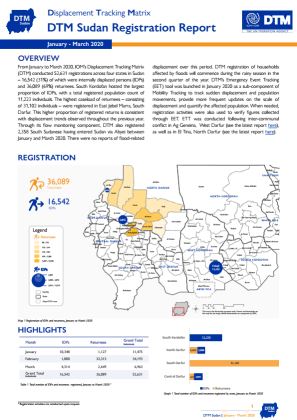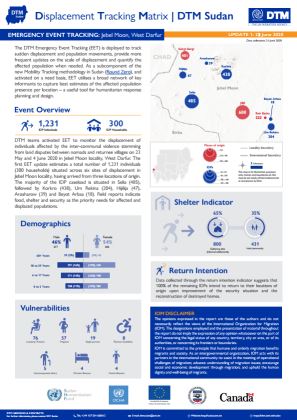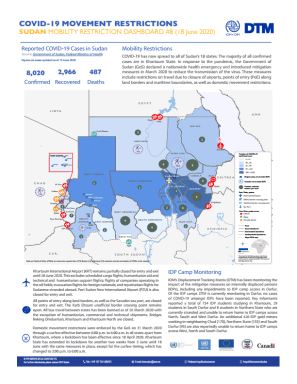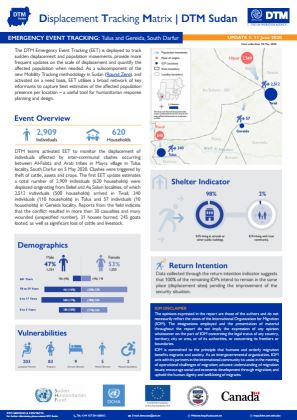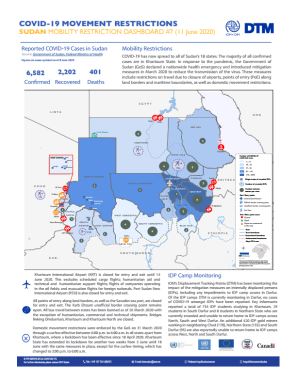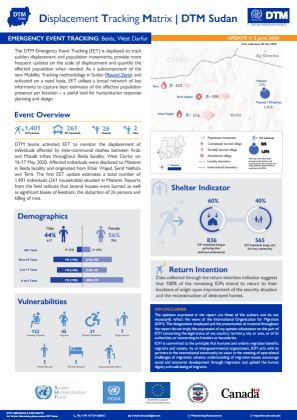-
Countries
-
Data and Analysis
-
Special Focus
-
Crisis Responses
Sudan
Suivi des PDI
Mouvements de déplacement
9,053,000
IDMC 2023
cycle de collecte de données
À propos Sudan
DTM is a system to track and monitor displacement and population mobility. It is designed to regularly and systematically capture, process and disseminate information to provide a better understanding of the movements and evolving needs of displaced populations, whether on site or en route. Data collection strategies and tools are based on the DTM global methodology but have been adapted to reflect the context and population movements specific to Sudan.
In order to appraise the humanitarian community with primary data on displacement caseloads and dynamics, DTM currently employs over 300 field enumerators to engage with its wide key informant network spanning all of Sudan’s 18 states. Enumerators are employed based on their prior knowledge of their areas of concern, and are trained on DTM Sudan’s global data collection standard and methodologies. To stay up-to-date with DTM’s outputs, please join our mailing list here.
Since 2004, DTM Sudan has provided rapid emergency registrations with a priority of meeting immediate information needs for guiding direct assistance to vulnerable people. In 2010, DTM expanded to include biometric registrations and data verifications – implemented in response to government or humanitarian partner requests. Registration data is mission critical for site managers to undertake beneficiary selection, vulnerability targeting, and to inform broader humanitarian programming. Additionally, DTM Sudan is has operated one Flow Monitoring Point at Abyei – registering the arrival of South Sudanese into the country.
Commencing in November 2019, DTM Sudan expanded its operations to implement Mobility Tracking (MT) across an initial seven states – expanding to reach a total of 17 states (as of Round Six). The MT methodology utilises key informant networks to systematically track mobility in locations of interest over consistent data collection rounds. Enumerators revisit each location and interview key informants to update locations and periodically verify population presence. DTM Sudan’s MT figures have been endorsed by the Humanitarian Aid Commission (HAC) and coordinated with UNOCHA, and is used to inform the Humanitarian Needs Overview (HNO) and Humanitarian Response Plan.
As a subcomponent of Mobility Tracking, Emergency Event Tracking (EET) is regularly deployed to track sudden displacements and population movements and provide more frequent updates when needed. EET is activated within 72 hours – one week after an event (such as natural disasters or conflict) to assist in rapid response planning. Prior to the implementation of EET, Early Warning Flash Alerts are disseminated within the first 24-48 hours of incidents to notify partners on sudden events where EET activities will subsequently take place. Additionally, DTM Sudan has designed Situation Assessments to collect data on populations in non-emergency settings or protracted situations caused by conflict or natural disaster.
Alongside the Mobility Tracking methodology, DTM has conducted Integrated Location Assessments (ILA). ILAs are utilised to enhance and provide accurate and up-to-date information on access to services at major sites of displacement, alongside profiles of displaced and returnee populations. The purpose of these exercises is to determine a severity level of living conditions of returnees and IDPs to allow partners to better strategize for resources and operations in vulnerable areas or to mitigate risks of push/pull factors for a more specific set of coherent interventions that bridge humanitarian, recovery, and stabilisation needs.
DTM has also supported data collection on the Multi-Sector Needs Assessment (MSNA). The MSNA aims to assess and provide timely update on sectoral humanitarian needs of populations across Sudan. In previous years, the MSNA provided an overview of the sectoral needs of IDP and non-displaced populations to inform humanitarian response and strategic programming. The MSNA is also the central component of providing a sound evidence base for the Humanitarian Needs Overview and Humanitarian Response Plan. The MSNA is completed in close coordination with UNOCHA, the Inter-Sector Coordination Group, and the National Assessment Task Team. Since 2021, DTM Sudan has typically conducted the MSNA on an annual basis in coordination with partners in the humanitarian community.
Since the onset of the military conflict between the Sudanese Armed Forces (SAF) and the Rapid Support Forces (RSF) commencing 15 April 2023, DTM Sudan has provided the humanitarian community with comprehensive updates on displacement trends observed as a direct result of the fighting. Six months following the conflict, DTM Sudan has observed IDPs in 167 of Sudan’s 189 localities, across all 18 states. Commencing with Situation Reports, and then becoming Weekly Displacement Snapshots, these reports also provide information on mixed-cross border flows to neighbouring countries. In these reports, DTM utilises a key informant methodology to capture best estimates of IDP caseloads, shelter typologies, and movement intentions. This information is gathered via dual combination of remote and face-to-face interviews. The Monthly Displacement Overview – which includes a greater contextual analysis including sex and age disaggregation, priority needs, and access to services at IDP locations.
For further information, please contact IOM Sudan:
- Tel.: +249 157 554 600/1/2
- Email: dtmsudan@iom.int
Bailleurs de fonds
- USAID
- ECHO
Sudan — Mobility Restriction Dashboard 15 (13 August 2020)
In response to the COVID-19 pandemic, the Government of Sudan (GoS) declared a nationwide health emergency and introduced mitigation measures in March 2020 to reduce the transmission of the virus.
Sudan — Emergency Event Tracking – Kas, South Darfur 1
The DTM Emergency Event Tracking (EET) is deployed to track sudden displacement and population movements, and provide more frequent updates on the scale of displacement and quantify the affected population when needed.
Sudan — Situation Assessment Report Jabal Marrah, Central Darfur 1
DTM Situation Assessments are implemented to collect data on populations in non-emergency settings or protracted situations caused by conflict or natural disaster, and utilise a broad network of key informants to provide an overview of the context and inform response planning.
Sudan — Mobility Restriction Dashboard 14 (6 August 2020)
In response to the COVID-19 pandemic, the Government of Sudan (GoS) declared a nationwide health emergency and introduced mitigation measures in March 2020 to reduce the transmission of the virus.
Emergency Event Tracking Report Misterei and Ag Geneina, West Darfur 002
The DTM Emergency Event Tracking (EET) is deployed to track sudden displacement and population movements, and provide more frequent updates on the scale of displacement and quantify the affected population when needed.
Sudan — Emergency Event Tracking Report Al Idia, West Kordofan
The DTM Emergency Event Tracking (EET) is deployed to track sudden displacement and population movements, and provide more frequent updates on the scale of displacement and quantify the affected population when needed.
Sudan — Mobility Restriction Dashboard 13 (30 July 2020)
In response to the COVID-19 pandemic, the Government of Sudan (GoS) declared a nationwide health emergency and introduced mitigation measures in March 2020 to reduce the transmission of the virus.
Sudan — Emergency Event Tracking Report Nyala Janoub, South Darfur
The DTM Emergency Event Tracking (EET) is deployed to track sudden displacement and population movements, and provide more frequent updates on the scale of displacement and quantify the affected population when needed.
Sudan — Emergency Event Tracking Report Aljabaal, Ag Geneina 1
The DTM Emergency Event Tracking (EET) is deployed to track sudden displacement and population movements, and provide more frequent updates on the scale of displacement and quantify the affected population when needed.
Mobility Restriction Dashboard 12 (23 July 2020)
In response to the COVID-19 pandemic, the Government of Sudan (GoS) declared a nationwide health emergency and introduced mitigation measures in March 2020 to reduce the transmission of the virus.
Jul 23 2020
Mobility Restriction Dashboard 12 (23 July 2020)
Sudan — Emergency Event Tracking Flash Report Tulus and Gereida, South Darfur 2
The DTM Emergency Event Tracking (EET) is deployed to track sudden displacement and population movements, and provide more frequent updates on the scale of displacement and quantify the affected population when needed.
Sudan — Emergency Event Tracking Report At Tina, North Darfur 2
The DTM Emergency Event Tracking (EET) is deployed to track sudden displacement and population movements, and provide more frequent updates on the scale of displacement and quantify the affected population when needed.
Sudan — Mobility Restriction Dashboard 11 (16 July 2020)
In response to the COVID-19 pandemic, the Government of Sudan (GoS) declared a nationwide health emergency and introduced mitigation measures in March 2020 to reduce the transmission of the virus.
Sudan — Emergency Event Tracking Report Jabal Marrah, Central Darfur
The DTM Emergency Event Tracking (EET) is deployed to track sudden displacement and population movements, and provide more frequent updates on the scale of displacement and quantify the affected population when needed.
Sudan — Mobility Restriction Dashboard 10 (9 July 2020)
In response to the COVID-19 pandemic, the Government of Sudan (GoS) declared a nationwide health emergency and introduced mitigation measures in March 2020 to reduce the transmission of the virus.
Sudan — Mobility Tracking Round 1 (July 2020)
Commencing in October 2019, DTM Sudan began its preparation for the first round of Mobility Tracking; this started with the training of IOM field teams across the seven states of implementation, namely North, East, South, West and Central Darfur, as well as South and West Kordofan.
Jul 07 2020
Sudan — Mobility Tracking Round 1 (July 2020)
Sudan — Mobility Restriction Dashboard 9 (2 July 2020)
In response to the COVID-19 pandemic, the Government of Sudan (GoS) declared a nationwide health emergency and introduced mitigation measures in March 2020 to reduce the transmission of the virus.
Sudan — Registration And Flow Monitoring Quarterly Overview (January - March 2020)
From January to March 2020, IOM’s Displacement Tracking Matrix (DTM) conducted 52,631 registrations across four states in Sudan – 16,542 (31%) of which were internally displaced persons (IDPs) and 36,089 (69%) returnees.
Sudan — Emergency Event Tracking Report Ag Geneina 10
The DTM Emergency Event Tracking (EET) is deployed to track sudden displacement and population movements, and provide more frequent updates on the scale of displacement and quantify the affected population when needed.
Sudan — Emergency Event Tracking Report Jebel Moon, West Darfur
The DTM Emergency Event Tracking (EET) is deployed to track sudden displacement and population movements, and provide more frequent updates on the scale of displacement and quantify the affected population when needed.
Sudan — Mobility Restriction Dashboard 8 (18 June 2020)
In response to the COVID-19 pandemic, the Government of Sudan (GoS) declared a nationwide health emergency and introduced mitigation measures in March 2020 to reduce the transmission of the virus.
Sudan — Emergency Event Tracking Flash Update Tulus and Gereida, South Darfur
The DTM Emergency Event Tracking (EET) is deployed to track sudden displacement and population movements, and provide more frequent updates on the scale of displacement and quantify the affected population when needed.
Sudan — Mobility Restriction Dashboard 7 (11 June 2020)
In response to the COVID-19 pandemic, the Government of Sudan (GoS) declared a nationwide health emergency and introduced mitigation measures in March 2020 to reduce the transmission of the virus.
Sudan — Emergency Event Tracking Beida, West Darfur
The DTM Emergency Event Tracking (EET) is deployed to track sudden displacement and population movements, and provide more frequent updates on the scale of displacement and quantify the affected population when needed.
Pagination
Pagination
- First page
- Previous page
- 1
- 2
- 3
- 4
- 5


